The purpose of this document is to provide an insider look at the application of the BalanceD-MERL approach in a program operating in a complex environment. The Women + Water Global Development Alliance is a five-year (2017-2022) collaboration among USAID, Gap, Inc., CARE, Water.org, the Institute for Sustainable Communities and the International Center for Research on Women. Together, these organizations are leveraging their complementary strengths to improve and sustain the health and well-being of women and communities touched by the apparel industry.
The BalanceD-MERL consortium delivered a MERL strategy to the Alliance. In this document, the BalanceD-MERL consortium shares their experience of applying the approach and provides key takeaways from the application of the approach. The BalanceDMERL consortium also gives decision-makers, program implementers, and MERL practitioners action–items to undertake to enhance the effectiveness of this approach.
The Balanced Design, Monitoring, Evaluation, Research, and Learning (BalanceD-MERL) consortium is a mechanism under the U.S. Global Development Lab’s Monitoring, Evaluation, Research, and Learning Innovations (MERLIN) program at the United States Agency for International Development (USAID). The consortium believes good program management integrates monitoring, evaluation, research, and learning (MERL) activities with program design (D) and implementation to achieve program objectives. Program design and implementation should not be thought of as separate from its MERL activities; these are indeed iterative processes that are deeply interconnected.
The consortium examines how balanced integration across all aspects of D-MERL enables teams to rapidly learn and incorporate findings into program design. The consortium also assesses how four principles – relevant, right-sized, responsible, and trustworthy – can be incorporated into D-MERL to enable sustainable integration of MERL with program design and adaptive management.
The BalanceD-MERL consortium consists of World Vision (prime), Innovations for Poverty Action, Institute for Development Impact, Search for Common Ground, and the William Davidson Institute at the University of Michigan.
1. Women + Water Global Development Alliance (Nov 2016 – Jan 2018)
The BalanceD-MERL consortium served as MERL technical experts to the Women + Water Global Development Alliance collaboration among USAID, Gap, Inc., CARE, Water.org, the Institute for Sustainable Communities and the International Center for Research on Women. Together, these organizations are leveraging their complementary strengths to improve and sustain the health and well-being of women and communities touched by the apparel industry. The consortium developed a MERL strategy for the Alliance and captured lessons learned in the following two resources:
2. BalanceD-MERL Maturity Matrix
The BalanceD-MERL Maturity Matrix is a tool that can be used by both program staff and MERL staff. It can facilitate program design (D) and implementation through improved performance management and/or evaluation.
3. Global Health Ebola Team (Dec 2016 – Dec 2018)
The consortium conducted an endline performance evaluation and data quality verification activity for the Global Health Ebola Team within the USAID Global Health Bureau. The Global Health Ebola Team managed a portfolio of activities aimed at addressing the second order impacts of the unprecedented Ebola virus disease outbreak in Guinea, Liberia, and Sierra Leone between 2014 and 2016. The following publications were produced from this work:

Developmental evaluation (DE) was created to evaluate innovative programs that operate in complex environments and are thus expected to adapt over time. The Developmental Evaluation Pilot Activity (DEPA-MERL), developed under the U.S. Global Development Lab’s Monitoring, Evaluation, Research and Learning Innovations (MERLIN) program at the United States Agency for International Development (USAID), is testing the effectiveness of DE in the USAID context. The DEPA-MERL consortium consists of Social Impact (prime), Search for Common Ground (Search), and the William Davidson Institute (WDI) at the University of Michigan.
As part of the consortium, Social Impact and Search are implementing DEs while WDI is serving as an evaluator to assess the effectiveness of this approach in the USAID context.
The WDI team seeks to answer the following three research questions:
DEPA-MERL conducted a DE with Family Care First (FCF) in Cambodia, in service of FCF’s goal of increasing the number of children living in safe, nurturing family-based care.
The Sustained Uptake DE was conducted in service of the Lab’s mission to source, test, and scale development solutions. The 22-month long DE helped several of the Lab’s teams to collect, analyze, and disseminate learnings regarding the uptake of the innovations that these teams seek to promote within and beyond USAID.
USAID’s transition from Bureau for Food Security (BFS) to the proposed Bureau for Resilience and Food Security (RFS) offered a unique opportunity for the Bureau to use DE to examine its knowledge management practices and improve its processes and systems around evidence-based decision making. While the DE ultimately did not fully launch, key lessons from the attempt were documented.
In early 2020, USAID launched its first-ever Digital Strategy in order to align the Agency’s vision for development assistance with the world’s evolving digital landscape. USAID’s Innovation, Technology, and Research (ITR) Hub, formerly the U.S. Global Development Lab, is responsible for leading the strategy implementation. DEPA-MERL launched a new DE in mid-2020 to support up to four of the Strategy’s 15 implementation initiatives by providing insights into how the initiatives work within their teams and with each other as well as timely input for decision making. For the first time at USAID, the Developmental Evaluator is being embedded remotely into the initiatives due to the COVID-19 pandemic.
The WDI team also conducted an analysis across the three DE pilots that occurred during the first five years of the MERLIN award. The report, Advancing the Use of Developmental Evaluation: A Summary of Key Questions Answered during a Multiyear Study of Developmental Evaluations Implemented at USAID, shares findings and lessons learned across the experiences to facilitate learning from the implementation of DE in the USAID context.
In addition to the pilots, the consortium also provides guidance for organizations, managers, and evaluators that seek to implement the developmental evaluation approach. Available resources include:
Please find additional case studies on the use of developmental evaluation including in non-DEPA MERL pilots here. Each case study provides background on the programming, the DE design and implementation approach, the suitability of DE, and lessons learned for implementation.
Using data from the first three pilots, WDI also published a paper in the Journal of MultiDisciplinary Evaluation. The paper explores how DE theory is used in practice and aims to expand the evidence base and strengthen future DE implementation.
This article is made possible by the generous support of the American people through the United States Agency for International Development (USAID). The contents are the responsibility of WDI and do not necessarily reflect the views of USAID or the United States Government. This article was produced by the William Davidson Institute at the University of Michigan in collaboration with Social Impact under the Developmental Evaluation Pilot Activity (DEPA-MERL), Contract Order Number AID-LAB-C-15-00002, funded by the U.S. Agency for International Development.
The William Davidson Institute is a collaborative, multi-disciplinary organization. As a result, WDI often engages multiple sector and services teams in our work. The following project undertaken by both our Healthcare sector and Performance Measurement and Improvement service demonstrates our holistic approach.
WDI is working with global medical device company, Becton, Dickinson & Company (BD), to assess the impact of the new program, Infection Prevention and Control, in Kenya. The goal of the program is to strengthen health worker and patient safety through appropriate safe intravenous infusion therapy practices, leveraging BD’s longstanding knowledge and safety-engineered technology designed to reduce the rate of needle-stick injuries in HCWs, thus contributing to the prevention of injection-transmitted infections such as HIV and other blood-borne pathogen transmission.
The William Davidson Institute is a collaborative, multi-disciplinary organization. As a result, WDI often engages multiple sector and services teams in our work. The following project undertaken by both our Healthcare sector and Performance Measurement and Improvement service demonstrates our holistic approach.
The goal of the program is to support quality laboratory systems, which are needed in order to effectively scale-up HIV prevention, care and treatment efforts. WDI’s work includes developing the Monitoring and Evaluation design and implementation plan, and collecting data to measure the impact of the program activities that include Strengthening Laboratory Management Towards Accreditation (SLMTA) training and BD mentorship, in multiple labs across Kenya, Uganda, Rwanda and India.
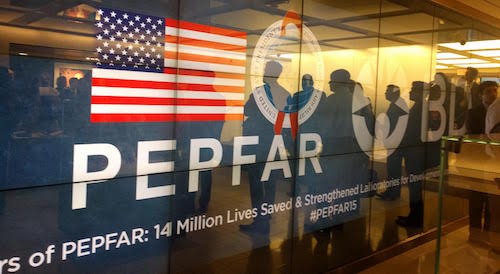
WDI has been commissioned by Becton, Dickinson and Company (BD), one of the largest global medical technology companies in the world, to be a monitoring and evaluation partner for their BD-PEPFAR public-private partnership with the U.S. State Department’s Office of the Global AIDS Coordinator (OGAC) and the U.S. Centers of Disease Control and Prevention (CDC). The U.S. President’s Emergency Plan for AIDS Relief (PEPFAR) is the largest commitment by any nation to combat a single disease in history.
As part of this work, Heather Esper, WDI’s senior program manager for the Performance Measurement Initiative (PMI), was invited to participate in a series of meetings with partners working on two BD-PEPFAR programs – Labs for Life and Infection Prevention and Control.
PMI, along with WDI’s Healthcare Initiative, is developing and will conduct an assessment of Phase 3 of the third Labs for Life partnership. The Institute will explore the impact and cost effectiveness of the Labs for Life activities, including laboratory system strengthening for improving quality management practices and fortifying specimen referral systems for HIV and TB.
WDI also conducted a retrospective assessment of the impact of selected activities for Phase 2 of Labs for Life. This work included a quantitative and qualitative analysis of a Kenya lab’s accreditation, and a quantitative assessment of the Kenyan National Public Health Laboratory Center of Excellence for Equipment Calibration, Certification and Training, which was set up and initiated by BD in partnership with the Ministry of Health. Esper and Pascale Leroueil, vice president of WDI’s Healthcare Initiative, presented the findings in April 2018 at the Labs for Life Phase 3 kickoff in London.
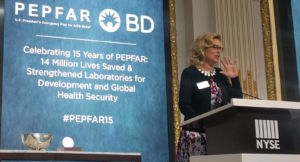
Deborah Birx, Ambassador-at-Large, U.S. Global AIDS Coordinator & U.S. Special Representative for Global Health Diplomacy
Also in conjunction with PEPFAR and BD, OGAC and the CDC, the Institute is working to design and implement an assessment of the impact of a new program, Infection Prevention and Control, in Kenya. The goal of the program is to strengthen health worker and patient safety through appropriate safe intravenous infusion therapy practices, leveraging BD’s longstanding knowledge and safety-engineered technology for averting HIV, hepatitis and other blood-borne pathogen transmission.
Esper said WDI is proud to be developing and implementing strong monitoring and evaluation systems on two PEPFAR public-private partnerships with BD, the Office of the Global AIDS Coordinator and the Centers for Disease Control and Prevention focused on the prevention and diagnosis of HIV/AIDS.
“Both of these monitoring, evaluation, research and learning (MERL) systems have a large focus on cost-effectiveness and will help inform activities that should be scaled to help meet the UNAIDS’ treatment goals and beyond,” she said. “These systems also allow partners to track activities as they are implemented with the goal of delivering more impact.”
As part of this work, on July 11 Esper and WDI Healthcare Research Associate Erika Beidelman, traveled to New York for two working meetings related to the monitoring and evaluation design of both PEPFAR programs.
That same morning, BD, PEPFAR and other BD guests rang the NYSE Opening Bell to celebrate a decade of partnerships to address HIV/AIDS as well as to recognize PEPFAR’s 15 year anniversary, which has impacted 14 million men, women, and children with HIV & AIDS globally. Deborah Birx, Ambassador-at-Large, U.S. Global AIDS Coordinator & U.S. Special Representative for Global Health Diplomacy, Office of Global AIDS Coordinator, was recognized by BD for her leadership.
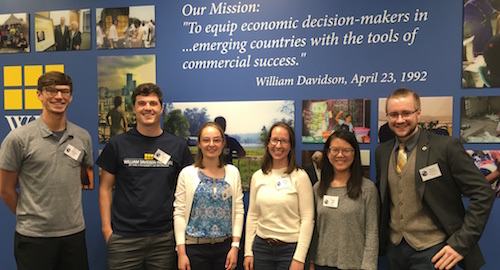
WDI’s 2018 summer interns before they set off on their voyages.
Over the years, WDI’s summer interns have faced unique challenges as they have conducted their work across the globe for the Institute and its partners. Impassable roads, extreme weather, the occasional wild animal. An active volcano can now be added to the list.
WDI intern Nadia Putri spent her summer in Bali, Indonesia working with East Bali Cashews on quality improvement projects, measuring the company’s impact on women and developing a U.S. market entry strategy. She also got an up close look at emergency preparedness.
“It was really beautiful, but a bit scary at the same time for someone who has never seen anything like it before,” she wrote of watching the sparks of lava and plume of smoke rise from the crater near where she was working. The cashew factory was outside the evacuation zone but management kept a daily eye on the volcano in case conditions changed. Earthquakes in the region have claimed nearly 400 lives during August.
Putri was one of six WDI interns working internationally this summer. Some, like Putri, have returned to the University of Michigan campus; others are finishing up their work and will be back in Ann Arbor soon. While overseas, the interns contributed to a blog to chronicle not only their work but also the experience of living in a foreign land. WDI has highlighted some of the work below and the full blog chronicling interns’ experiences is available here.
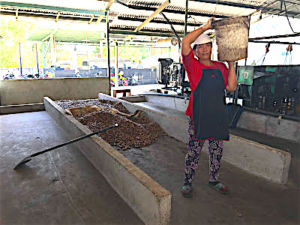
East Bali Cashews where Putri worked sources sustainably grown cashews from nearby smallholder farmers and processes them in a factory located in a remote village in one of Bali’s poorest regions. Since its launch in 2012, the company has integrated various social missions in and around its cashew processing operations, including community improvement and women’s empowerment.
Putri, a Ross School of Business MBA candidate, said factory workers were very supportive of her work and willing to explain how the company has impacted them. One employee recalled being hired after graduating from high school and is now in charge of 50 workers.
“At the factory, everyone is very welcoming and open to share their stories,” Putri wrote in her blog. “It’s especially humbling to see such high curiosity and willingness to learn from the factory employees. This serves as my daily reminder that (the) situation you grew up or lived in does not define who you could be.”
In Kenya, Andrea Arathoon, a School of Public Health graduate student, was tasked with helping a local maternity hospital reduce costs and increase patient volumes to achieve sustainability while also maintaining quality. One intervention Arathoon worked on for Jacaranda Maternity is a new outpatient care checklist for prenatal visits.
 The checklist is designed to improve patient processing within the outpatient clinic. This improved flow will reduce wait times and result in more efficient consultations, thus increasing patient volume and reducing costs, Arathoon wrote. She ensured the checklist followed the World Health Organization and Kenya Ministry of Health guidelines. The hospital’s doctors, nurses and administrative staff were consulted, and everyone was trained on how to properly use the new tool.
The checklist is designed to improve patient processing within the outpatient clinic. This improved flow will reduce wait times and result in more efficient consultations, thus increasing patient volume and reducing costs, Arathoon wrote. She ensured the checklist followed the World Health Organization and Kenya Ministry of Health guidelines. The hospital’s doctors, nurses and administrative staff were consulted, and everyone was trained on how to properly use the new tool.
“I am very excited about my summer project and the impact that it can have in improving maternity care for women and children in the country,” Arathoon wrote on the blog.
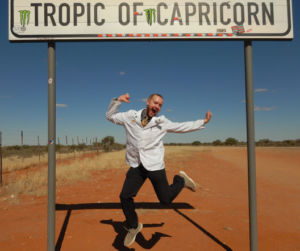
Across Africa on the Atlantic coast, Mason Benjamin is working in Namibia on pharmacy workforce development and hospital pharmacy practice. Benjamin, a College of Pharmacy graduate student, joined a collaborative project between WDI and the International Pharmaceutical Federation Hospital Pharmacy Section. The goal of the project, which includes the University of Namibia School of Pharmacy, is to increase the capacity of hospital pharmacists in Namibia through in-country diagnostics and technical assistance.
Benjamin has been traveling all across the country to visit hospital pharmacies in different regions to develop a landscape analysis of hospital pharmacy practices at both private and public hospitals. Before his site visits began, Benjamin attended the Medication Utilization Review In Africa (MURIA) conference, where he learned about pharmacy practice not only in Namibia but also across Africa.
“I was aware of how different the healthcare system in the United States might be from anywhere else in the world, but always felt that researching other systems online had its limits,” Benjamin wrote in the blog. “I much prefer to learn right from the source and in person, so I was grateful for the opportunity to ask questions to practicing pharmacists from over a dozen different African countries about how things worked in their setting.”
In India, the population of cities is expected to increase by 250 million people in the next 20 years, making employment a crucial need for the new transplants. Ross School of Business MBA student Chris Owen is working with MADE (Michigan Academy for the Development of Entrepreneurs) and its Madurai-based partner Poornatha, which is designing an affordable, world-class coaching curriculum for entrepreneurs in emerging economies. MADE was founded by WDI and U-M’s Zell Lurie Institute.
Owen is identifying best practices of existing coaching programs in India and other emerging economies, conducting a needs assessment of entrepreneurs in Madurai and developing a framework and training curriculum for how coaches will be identified, on-boarded and trained.
“By investing in strong local economies, India can address its dual-challenges of rapid urbanization and rising unemployment,” Owen wrote on the intern blog. “Indeed, for this reason, entrepreneurship in India – and the work of Poornatha – is becoming increasingly important.”
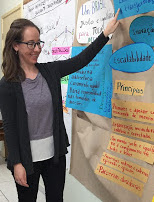 In Brazil, Rebecca Grossman-Kahn – a student at Ross and the U-M Medical School – is developing a tool to assess the social impact of the gender equality programs of Plan International’s Brazil office. Plan International has a long history of advocating for children’s rights but recently decided to focus its work in Brazil on promoting girls’ rights and equality. Gender roles in Brazil tend to be rigid and many girls stop studying in middle or high school to help with housework at home, Grossman-Kahn wrote on the blog. She attended a staff retreat to strategize on how to combat resistance from community members and organizations regarding Plan’s new focus on gender.
In Brazil, Rebecca Grossman-Kahn – a student at Ross and the U-M Medical School – is developing a tool to assess the social impact of the gender equality programs of Plan International’s Brazil office. Plan International has a long history of advocating for children’s rights but recently decided to focus its work in Brazil on promoting girls’ rights and equality. Gender roles in Brazil tend to be rigid and many girls stop studying in middle or high school to help with housework at home, Grossman-Kahn wrote on the blog. She attended a staff retreat to strategize on how to combat resistance from community members and organizations regarding Plan’s new focus on gender.
While at the retreat, a new World Bank report was released that showed girls who complete secondary education can expect to earn twice as much as those with no education.
“Studies like this can help get community leaders on board with Plan’s mission,” Grossman-Kahn wrote.
In Nepal, nearly two out of three working people are farmers. But the country’s rugged topography and lack of infrastructure makes it difficult to farm year-round despite a lengthy monsoon season. Additionally, in rural Nepal, only 5 percent of the population has reliable access to electricity. But the country has more than 300 days of sunshine, making it a perfect candidate for solar-powered agricultural services.
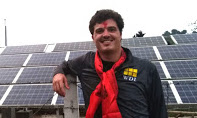 Matthew Carney, a dual degree student at Ross and the U-M School for Environment and Sustainability, spent the summer with the solar startup Ecoprise to help bring solar-powered agricultural services to subsistence farmers in the Terai region of Nepal that borders India. AgroHub, a pay-as-you-go service-based business model recently started by Ecoprise, provides access to solar-powered infrastructure for remote, underserved farming communities. These hubs provide farmers with access to equipment for irrigation, clean drinking water, food-processing and refrigerated post-harvest storage as a service.
Matthew Carney, a dual degree student at Ross and the U-M School for Environment and Sustainability, spent the summer with the solar startup Ecoprise to help bring solar-powered agricultural services to subsistence farmers in the Terai region of Nepal that borders India. AgroHub, a pay-as-you-go service-based business model recently started by Ecoprise, provides access to solar-powered infrastructure for remote, underserved farming communities. These hubs provide farmers with access to equipment for irrigation, clean drinking water, food-processing and refrigerated post-harvest storage as a service.
AgroHub has proved very successful for those farmers who have used it, allowing them to irrigate more land during the winter and monsoon seasons and reducing the use of diesel-powered water pumps that saves money. Carney’s task is to develop a plan to bring the service to farmers in western Nepal.
“Solar-powered agriculture presents an opportunity to raise the living standards of millions of rural Nepali farmers in a sustainable fashion,” he wrote. “It would be a shame to waste it.”
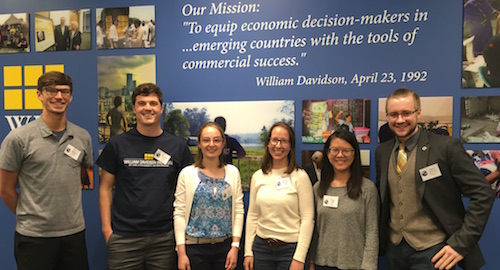
Six U-M graduate students are participating in the 2018 WDI Global Impact Internship program.
When Rebecca Grossman-Kahn was in high school, she was a volunteer with Amigos de las Américas, a youth leadership and cultural exchange program that partners with Plan International, a global development and humanitarian organization. While an undergrad at Stanford University, she worked in Honduras and Nicaragua for the organization.
“I just loved it,” she said. “I loved living in a different place, I loved speaking Spanish.”
So when the Ross School of Business MBA candidate and University of Michigan Medical School student was looking to create her own summer internship, she reached out to several organizations. The first to respond was Plan International, which works to empower children – especially girls.
“They were interested in revamping their evaluation program and I knew WDI worked in performance measurement,” Grossman-Kahn said.
She pitched the partnership to WDI as a student-initiated internship and it was approved. In mid-June, she will head to Brazil to develop a survey tool Plan International will use to assess the impact of their programs. In addition to student-initiated internships, WDI also develops student summer opportunities along with its partners.
Grossman-Kahn is one of six U-M graduate students participating in the 2018 WDI Global Impact Internship program. The students represent the Ross School of Business, the School of Public Health, the College of Pharmacy, the School for Environment and Sustainability (SEAS) and the Medical School. They will work in Brazil, India, Indonesia, Kenya, Namibia and Nepal, and support the work of WDI initiatives in Education and its Entrepreneurship Development Center, Energy, Healthcare, Performance Measurement and Scaling Impact. All of the interns have met with their respective WDI initiative leaders and will continue to keep in touch once in the field.
Colm Fay, who leads WDI’s Energy Initiative, said he is interested in understanding more about access to energy for productive use because of the impact it can have in low- and middle-income countries. Fay will be working with graduate student Matthew Carney, who will be interning at Ecoprise, which designs, builds and installs clean energy products in Nepal for energy-poor communities.
“Matt’s work with Ecoprise will provide important learnings about how an innovative business model to provide energy for agricultural loads can impact rural livelihoods, and how the well-being of these communities can be enhanced through greater access to energy,” Fay said.
Fay also directs WDI’s Scaling Impact initiative and is working on a project in Kenya with intern Andrea Arathoon. He said Scaling Impact wants to develop tools and frameworks that help enterprises achieve sustainability at scale.
“Andrea’s experience with Jacaranda, an organization that is seeking both to scale its operations as well as replicate its approach through partners, will further our understanding of the strategies and resources that are necessary to design business models for scale,” Fay said. “Her work will also provide great insights on how enterprises measure performance in terms of both sustainability and impact, and how best to frame this for investors.”
For Grossman-Kahn, her summer in Brazil will not be her first trip to the country. She lived there while participating in a study abroad program as an undergrad and learned Portuguese. She is looking forward to going back and collaborating with a familiar partner.
Grossman-Kahn said she will split her time between doing high-level strategy work in an office in Sao Paulo and observing Plan International’s programs in rural towns.
“I’m really excited about working with Plan International again,” she said. “They are really mission driven. Everyone in the organization is passionate about the work they’re doing.”
Here are the all WDI interns and their projects:
Andrea Arathoon
School of Public Health
Jacaranda Health
Nairobi, Kenya
WDI Partner: Scaling Impact initiative
Jacaranda Health operates a maternity hospital where it sees more than 2,000 clients a month and wants to create East Africa’s first truly sustainable and scalable maternal health service delivery organization. It is partnering with 15 government hospitals to refine a model for improving quality of maternal healthcare in the public sector.
Andrea will develop the latest version of Jacaranda’s business model and debt/equity financing structure for its next round of investment. She also will assess market and business model opportunities for expansion, improve profitability in the hospital by evaluating new service lines, marketing and customer insights.
Mason Benjamin
School of Pharmacy
WDI & International Pharmaceutical Federation (FIP) Hospital Pharmacy Section (HPS)
Namibia
WDI Partner: Healthcare initiative
FIP is a global federation representing 3 million pharmacists and pharmaceutical scientists worldwide. The Hospital Pharmacy Section’s objectives are to further hospital pharmacy in all its aspects, including the needs of developing countries. FIP, in partnership with WDI, is establishing a collaboration with the University of Namibia School of Pharmacy to increase the capacity of hospital pharmacists in two pilot countries, Namibia and Pakistan, through in-country diagnostics and technical assistance. The summer intern will provide preliminary research on Namibia, which will then inform next steps and content design for this collaboration in pharmacy workforce development.
Mason will develop a landscape analysis of hospital pharmacy practices in Namibia, both at private and public hospitals, in support of a larger pharmacy workforce development goal.
Nadia Putri
Ross School of Business
East Bali Cashews
Bali, Indonesia
WDI Partner: Entrepreneurship Development Center (Education Initiative)
Founded in 2012, East Bali Cashews (EBC) sources sustainably grown cashews from nearby smallholder farmers and processes them in a factory located in a remote village in one of Bali’s poorest regions. Since its launch, the company has integrated various social missions in and around their cashew processing operations, including community improvement and women’s empowerment.
For her internship, Nadia will design a U.S. market entry strategy and actionable roadmap, develop sustainable quality and efficiency improvements and create a food production “best practices” guide. Additionally, in partnership with WDI’s Entrepreneurship Development Center, Nadia will develop a strategy to support EBC’s mission for women empowerment and develop a mini case study how they would achieve it.
Chris Owen
Ross School of Business and School for Environment and Sustainability
Michigan Academy for the Development of Entrepreneurs (MADE)
India
WDI Partner: WDI President Paul Clyde
The Michigan Academy for the Development of Entrepreneurs (MADE) is a U.S.-based nonprofit organization whose aim is to develop entrepreneurs in emerging economies. MADE was founded by the William Davidson and Zell-Lurie Institutes at the University of Michigan and Aparajitha Foundation in Madurai, India. MADE provides Entrepreneurship Development Organizations (EDOs) in emerging economies a repeatable, scalable, transferable and profitable service platform to develop entrepreneurs in their home countries.
For his project, Chris will Identify best practices of existing coaching programs in India and other emerging economies, conduct a needs assessment of entrepreneurs in Madurai and develop a framework and training curriculum for how coaches will be identified, on-boarded and trained. Chris’ work continues a succession of Ross School student teams who have worked with MADE since its launch in late 2017.
Rebecca Grossman-Kahn
Ross School of Business and University of Michigan Medical School
Plan International
Brazil
WDI Partner: Performance Measurement initiative
Plan International is a not-for-profit, non-governmental organization founded in 1937. It is a development and humanitarian organization that advances children’s rights and equality for girls through various programs.
For her internship, Rebecca will develop a tool to assess the social impact of Plan Brazil’s gender equality programs; develop a framework for evaluating impact of violence prevention and girls’ empowerment programs that can be adapted to other partner organizations and in other settings. In addition, Rebecca will also analyze Plan International’s program cost structure and provide recommendations for standardizing and cost savings.
Matthew Carney
Ross School of Business and School for Environment and Sustainability
Ecoprise
Nepal
WDI Partner: Energy initiative
Founded six years ago, Ecoprise designs, builds and installs clean energy products in Nepal for the underserved, energy-poor communities in order to create positive economic, environmental and social impact. Ecoprise recently started AgroHub, a pay-as-you-go service-based business model that aims to provide access to solar-powered infrastructure for remote underserved farming communities. These hubs provide farmers with access to equipment for irrigation, clean drinking water, food-processing and refrigerated post-harvest storage as a service, with ownership of equipment remaining with AgroHub or Ecoprise.
Matthew will develop a theory of change report and a business plan for Ecoprise’s AgroHub model in western Nepal.
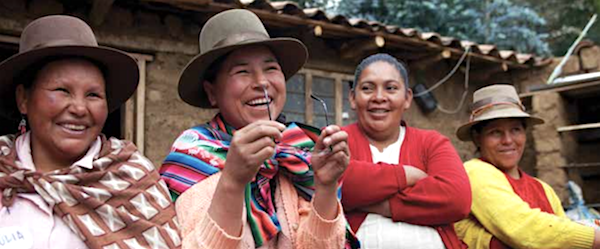
Women working with Chakipi Acceso in Peru. Image courtesy of Chakipi.
Note: The following post was co-written by Rebecca Baylor, Heather Esper and Yaquta Kanchwala Fatehi of WDI’s Performance Measurement Initiative. It was originally published on NextBillion.net, which is managed by WDI.
For many businesses and organizations, the idea of measuring their impacts is usually one of three things: scary, elusive or just plain boring. To make matters worse, evaluators have a rotten reputation for using too much annoying technical jargon. While there is some truth to these stereotypes, it doesn’t have to be all bad.
Our work demonstrates that it is possible to bridge the gap between people and metrics in a meaningful way.
In fact, our team at the William Davidson Institute recently released an impact report that demonstrates how we guided three organizations on how to demystify data collection of their social impacts. We worked with senior level leadership to develop strong surveys and data collection processes suited to their context. Perhaps more importantly, we openly discussed their measurement concerns and made explicit– dare we say, energetic– connections between their impact metrics and organizational strategy.
A key theme throughout this project was our goal to combine social and business metrics. When organizations – from enterprises to impact investors – actually track these types of combinations, which we refer to as “power couples,” they can absorb unique insights to solve key business challenges while communicating impact evidence. Through our work, we have encountered a number of social + business metric power couples that we’ve seen influence internal decision-making at organizations and improve results. Creating these power couples enables managers to more holistically harness their data to better meet business goals and increase intended impacts. For example, employee retention, an all-important business metric, may be affected by the impact that an organization has on the quality of life of their employees’ children, a social metric. This may be especially true for low- or middle-income employees.
Here are just a few common power couples that we identified during this project (detailed in the report) and others.
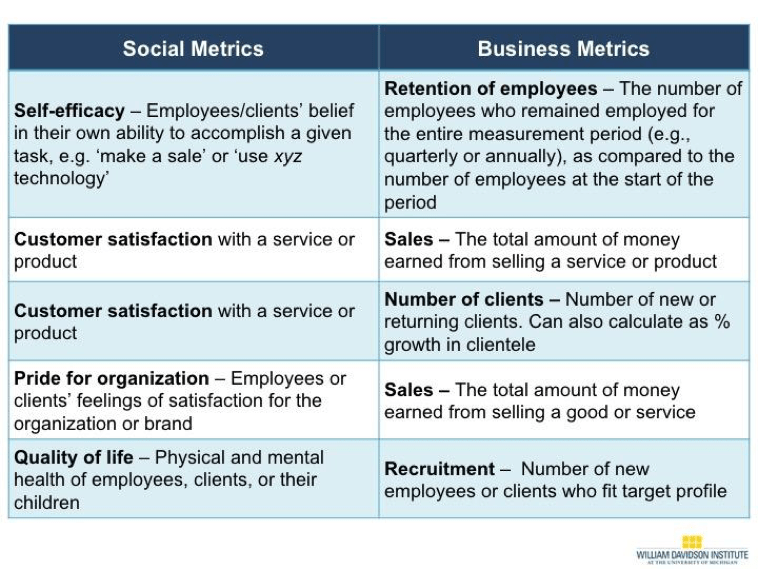
This list is just a start.
Selecting metrics takes time and patience. Indeed, finding the right metrics can be a lot like parenting. There isn’t one perfect formula and your strategy will likely evolve over time. However, we recommend businesses and investors interested in seeing social or environmental impact use some of the following strategies to make their job easier. We’re also including relevant resources to help you apply these strategies:
We hope these combinations excite you and inspire you to create a few social + business metrics of your own. Also, check out our case study for five lessons learned to accelerate successful impact measurement as an investor or investee. And if you enjoyed this post, share it, tweet it, or comment below! We’re also very curious about what social + business metric combinations have or haven’tworked for you. We look forward to hearing from you.
See? Impact measurement isn’t as scary (or as boring) as it may first seem.
Rebecca Baylor is a research associate for the Performance Measurement Initiative.
Heather Esper is the senior program manager for WDI’s Performance Measurement Initiative.
Yaquta Kanchwala Fatehi is a program manager for WDI’s Performance Measurement Initiative.
Many organizations working with small businesses in low-income countries struggle with how to separate powerful, but anecdotal, stories from true social impact that can be measured and replicated. This Impact Report, “Positive Change Through Actionable Metrics,” highlights WDI’s work with three social enterprises in Brazil, Nicaragua and Peru and focuses on how organizations can achieve measurement that is meaningful for capturing impacts and making operational decisions.
This Impact Report is the second in an ongoing series of reports that chronicle the long-term impact WDI is having in certain sectors or particular geographies. The first report, “Improving Business Education in the Philippines” was released in 2017. It examines a five-year project in which WDI helped train professors from 52 universities and focused on strengthening Science, Technology, Research and Innovation for Development (STRIDE) across the island nation.